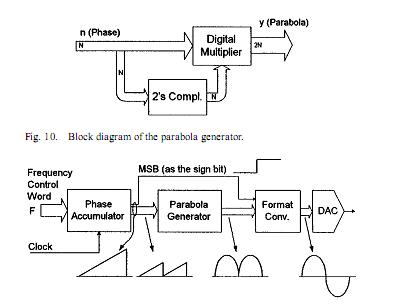haxaan
Newbie level 2
I need help in completing my semester project on verilog. I have made the code and it is compiling well but when I try to simulate, I get dozens of errors. I will greatly appreciate if someone can guide me with this coz I need to transfer the code on Spartan-3 fpga very soon. Here is the complete code I have mustered by now:
//MAIN stimulus file
//PHASE ACCUMULATOR
//FOUR BIT ADDER
//PARABOLA GENERATOR
//TWO's COMLEMENT
//FULL ADDER TO BE USED IN TWO's COMPLEMENT
//MULTIPLIER
//FORMAT CONVERTER - FROM SIGNED TO UNSIGNED
Added after 3 hours 24 minutes:
Block diagram of my project

//MAIN stimulus file
Code:
module main();
reg CLK;
reg signed [31:0] WORD;
wire [7:0] PARABOLA;
wire [7:0] PHASE;
wire SIGN;
wire [6:0] TEMP;
//--------------
accumulator_phase pa(.word(WORD), .clk(CLK), .phase(PHASE), .sign(SIGN));
parabola_gen pg(.phase(PHASE), .parabola(TEMP));
format_converter fc(.signed_parabola(TEMP), .sign_ac(SIGN), .out_bits(PARABOLA));
initial // Clock generator
begin
CLK = 1'b0;
WORD = 32'b0;
WORD[13] = 32'sh01000000;
end
always
begin
#20 CLK = 1'b1;
#20 CLK = 1'b0;
#20 CLK = 1'b1;
#20 CLK = 1'b0;
end
initial
$monitor($stime, CLK, WORD, PARABOLA);
endmodule//PHASE ACCUMULATOR
Code:
module accumulator_phase(word, clk, phase, sign);
input [31:0] word;
input clk;
output [7:0] phase;
output sign;
//------------
wire signed [31:0] word;
wire clk;
wire c1, c2, c3, c4, c5, c6, c7, c8;
reg signed [31:0] x;
reg signed [31:0] res;
reg [7 : 0] phase;
reg sign;
//-------
//------------------------------------------
initial
begin
phase <= 8'b0;
x <= 32'b0;
res <= 32'b0;
sign <= 1'b0;
end
always @(posedge clk)
begin
//------------------
phase <= res[30 : 23];
sign <= res[31];
end
four_bit_adder fba1(res[3:0], c1, word[3:0], x[3:0], );
four_bit_adder fba2(res[7:4], c2, word[7:4], x[7:4], c1);
four_bit_adder fba3(res[11:8], c3, word[11:8], x[11:8], c2);
four_bit_adder fba4(res[15:12], c4, word[15:12], x[15:12], c3);
four_bit_adder fba5(res[19:16], c5, word[19:16], x[19:16], c4);
four_bit_adder fba6(res[23:20], c6, word[23:20], x[23:20], c5);
four_bit_adder fba7(res[27:24], c7, word[27:24], x[27:24], c6);
four_bit_adder fba8(res[31:28], c8, word[31:28], x[31:28], c7);
endmodule//FOUR BIT ADDER
Code:
module four_bit_adder(sum, carry_out, a, b, carry_in);
output [3:0] sum;
output carry_out;
input [3:0] a;
input [3:0] b;
input carry_in;
wire w1, w2, w3, w4, w5, w6, w7, w8, w9, w10, w11, w12;
wire c1, c2, c3;
//--------------
xor (w1, a[0], b[0]),
(sum[0], w1, carry_in);
and (w2, a[0], b[0]),
(w3, w1, carry_in);
or (c1, w2, w3);
//--------------
xor (w4, a[1], b[1]),
(sum[1], w4, c1);
and (w5, a[1], b[1]),
(w6, w4, c1);
or (c2, w5, w6);
//--------------
xor (w7, a[2], b[2]),
(sum[2], w7, c2);
and (w8, a[2], b[2]),
(w9, w7, c2);
or (c3, w8, w9);
//--------------
xor (w10, a[3], b[3]),
(sum[3], w10, c3);
and (w11, a[3], b[3]),
(w12, w10, c3);
or (carry_out, w11, w12);
//--------------
endmodule//PARABOLA GENERATOR
Code:
module parabola_gen(phase, parabola);
input [7:0] phase;
output [6:0] parabola;
//--------------------
wire [7:0] phase;
reg [6:0] parabola;
reg [15:0] result;
reg signed [7:0] temp;
//---------------------
two_comp tc(phase, temp);
multiply mul(result,,phase,temp,1'b1);
//---------------------
initial
begin
parabola <= 7'b0;
result <= 16'b0;
end
always
begin
parabola = result[15 : 9];
end
endmodule//TWO's COMLEMENT
Code:
module two_comp(bits_in, bits_out);
input [7:0] bits_in;
output [7:0] bits_out;
wire [7:0] bits_in;
reg [7:0] bits_out;
reg [7:0] bits_inv;
reg [6:0] carry_tmp;
//------------------
initial
bits_out = 8'b0;
always
bits_inv[7:0] = bits_in[7:0];
//------------------------------------
fulladd addbit1 (bits_inv[0], 1, 0, bits_out[0], carry_tmp[0]);
fulladd addbit2 (bits_inv[1], 0, carry_tmp[0], bits_out[1], carry_tmp[1]);
fulladd addbit3 (bits_inv[2], 0, carry_tmp[1], bits_out[2], carry_tmp[2]);
fulladd addbit4 (bits_inv[3], 0, carry_tmp[2], bits_out[3], carry_tmp[3]);
fulladd addbit5 (bits_inv[4], 0, carry_tmp[3], bits_out[4], carry_tmp[4]);
fulladd addbit6 (bits_inv[5], 0, carry_tmp[4], bits_out[5], carry_tmp[5]);
fulladd addbit7 (bits_inv[6], 0, carry_tmp[5], bits_out[6], carry_tmp[6]);
fulladd addbit8 (bits_inv[7], 0, carry_tmp[6], bits_out[7], carry_out);
endmodule//FULL ADDER TO BE USED IN TWO's COMPLEMENT
Code:
module fulladd(a, b, carry_in, sum, carry_out);
input a;
input b;
input carry_in;
output sum;
output carry_out;
reg sum;
reg carry_out;
//----------------
always @ (a or b or carry_in)
begin
case ({a,b,carry_in})
3'b000:
{sum,carry_out} = 3'b000;
3'b010:
{sum,carry_out} = 3'b010;
3'b100:
{sum,carry_out} = 3'b010;
3'b110:
{sum,carry_out} = 3'b100;
3'b001:
{sum,carry_out} = 3'b010;
3'b011:
{sum,carry_out} = 3'b100;
3'b101:
{sum,carry_out} = 3'b100;
3'b111:
{sum,carry_out} = 3'b001;
endcase
end
endmodule//MULTIPLIER
Code:
module multiply (product,
ready,
multiplicand,
multiplier,
start);
input [7:0] multiplicand;
input [7:0] multiplier;
input start;
output product;
output ready;
//------------------
reg [31:0] product;
reg [4:0] bit;
wire ready = !bit;
reg lostbit;
//--------------------
initial bit = 0;
//--------------
always
if( ready && start ) begin
bit = 16;
product = { 16'd0, multiplier };
lostbit = 0;
end else if( bit ) begin:A
case ( {product[0],lostbit} )
2'b01: product[31:16] = product[31:16] + multiplicand;
2'b10: product[31:16] = product[31:16] - multiplicand;
endcase
lostbit = product[0];
product = { product[31], product[31:1] };
bit = bit - 1;
end
endmodule//FORMAT CONVERTER - FROM SIGNED TO UNSIGNED
Code:
module format_converter(signed_parabola, sign_ac, out_bits);
input [6:0] signed_parabola;
input sign_ac;
output [7:0] out_bits;
//--------------------
wire sign_ac;
wire [6:0] signed_parabola;
reg [7:0] temp;
reg [7:0] out_bits;
initial
begin
temp <= 8'b0;
out_bits <= 8'b0;
end
always
begin
temp[7] <= sign_ac;
temp[6:0] <= signed_parabola;
out_bits <= $unsigned(temp);
end
endmoduleAdded after 3 hours 24 minutes:
Block diagram of my project
